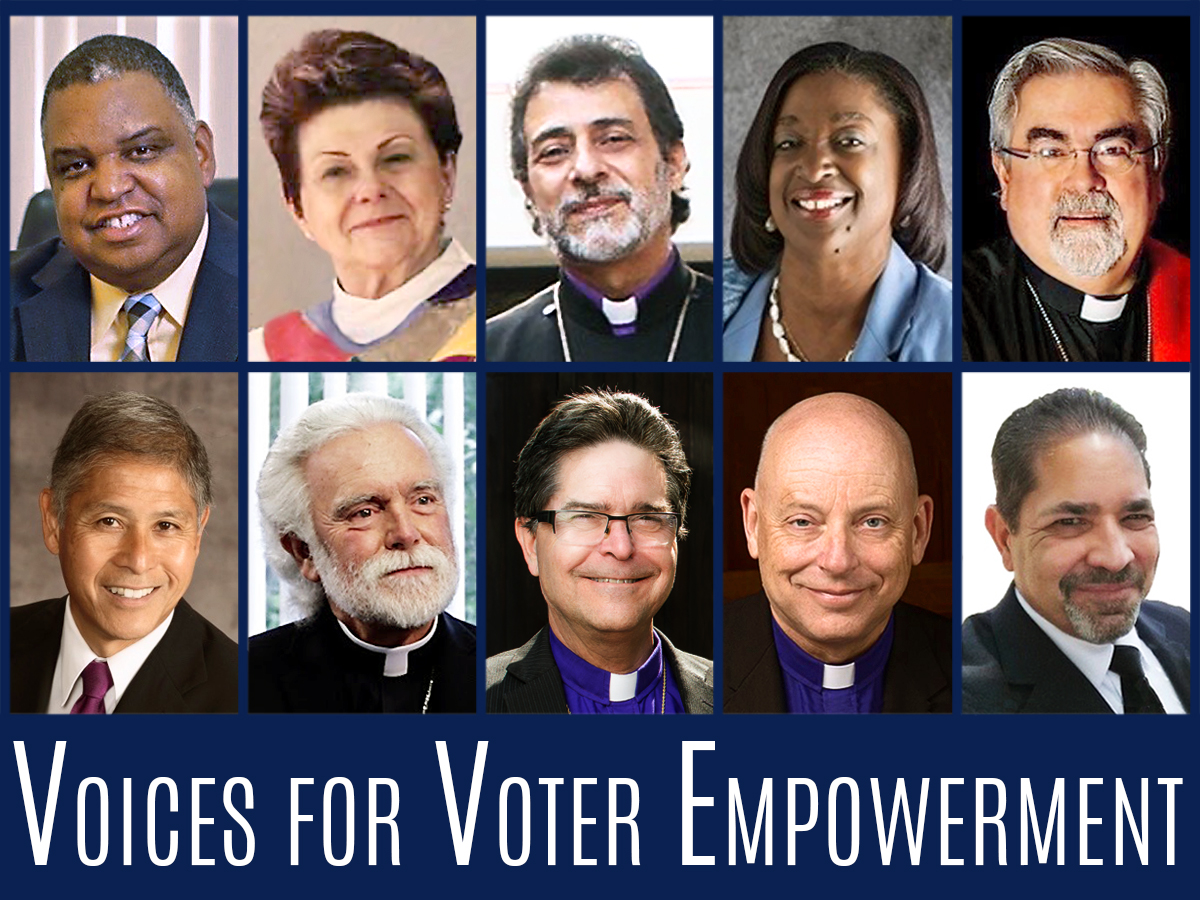Even as we believe that a Christian’s eternal citizenship is in heaven, as Christians we live out our temporal lives in this world, and it is in this life—and this world—that we are called by Christ to worship God and serve our neighbor. In the branches of the Western Christian tradition our churches represent, there has always been a strong intersection between the spiritual call of the church to conduct worship and promote faithfulness and ethical conduct among believers, and our belief in the duty of temporal government to use public power and civil law to promote justice and the welfare of all.
In slightly varying ways, our churches have each taught that civic engagement—good citizenship—is the duty of every Christian. While our churches have not always approached the question in the same way, and none of our traditions has been static, in the pluralistic and democratic American context all of our churches have advocated strongly for our members to be actively engaged, and to avail themselves of the rights of citizenship, particularly by participating in elections. At the same time, for the most part our churches have avoided conscious identification with particular political parties or direct endorsement of individual candidates, maintaining respect for our members’ right to vote as their consciences direct.
That we are non-partisan, however, does not mean that we have been disengaged from the issues and policies that impact the neighborhoods where our local congregations are found. In various ways and at different times, each of our churches has advocated for measures that have improved the welfare and health of society; all of our churches have advocated for greater justice for those disadvantaged and disenfranchised by prejudice, whether religious, racial, or ethnic. We have advocated for our own members and we have fought for the rights of others. In this political engagement we feel we live out our gospel call to honor God and serve our neighbor.
Over time, each of our churches has expressed specific ideas of what our vote for the neighbor’s sake might entail: expanding civil rights and racial equity; more compassionate immigration and refugee policies; expanded health care; compassion toward those suffering homelessness—these are all issues that cut across communities and our churches, but which we have promoted to our people in the past. Our churches have used social statements, pastoral letters, action alerts, and joint statements by our bishops to define what we believe most important in each generation and in each election. We have particular issues important to each of us; we have different ways of defining our theological approaches to issues. But this we have in common: the desire to be agents for the improvement of our society to the betterment of its citizens.
As bishops and leaders of historic Christian churches in the United States of America, and for the Los Angeles area, we believe that all the people of our churches should use the privilege of the vote in national, state, and local elections. We are deeply committed to our people’s right to vote, and we believe any efforts to limit voting or make it more difficult are improper and misguided, and disadvantage the very people we feel most obligated to defend. Indeed, in the wake of events that have galvanized the nation following the May 25 death of George Floyd, it is even more important to assure that all voices are heard, especially those of the marginalized. We do this for their sake, and for everyone’s sake, in order to form a more complete and therefore more perfect union.
Further, though we want our people to vote as they believe, we want them also to understand that voting is a way of living out the principle of loving our neighbor as ourselves. We should vote not just in our self-interest, but in ways that benefit and —above all—do not harm our neighbor. For what does it profit us as a community, to benefit ourselves at our neighbors’ expense? Citizenship exercised in a Christian way considers the welfare of others as much as our own. This is not a view we often hear expressed in our political discourse, but it is central to us—and we wish to lift it up not only to our own people, but to the community as a whole.
Faithfully,
The Rev. John Cager
Pastor, Ward A.M.E. Church & President, Los Angeles Council of Religious Leaders
The Rev. Linda L. Culbertson
General Presbyter, Presbytery of the Pacific
His Eminence, Archbishop Hovnan Derderian
Primate, Western Diocese of the Armenian Church
Jacquelyn Dupont-Walker
Director, Social Action Commission, A.M.E. Church
Bishop R. Guy Erwin
Southwest California Synod, Evangelical Lutheran Church in America
Bishop Grant Hagiya
California-Pacific Conference, United Methodist Church
Rt. Rev. Alexei Smith
Ecumenical Officer, Archdiocese of Los Angeles
Bishop Andrew A. Taylor
Pacifica Synod, Evangelical Lutheran Church in America
The Rt. Rev. John Harvey Taylor
Bishop, Episcopal Diocese of Los Angeles
Rev. Dr. Felix C. Villanueva
Conference Minister, So. Calif. Nevada Conference, United Church of Christ
(Signatories are pictured from left to right, beginning with top row, alphabetically by surname.)

